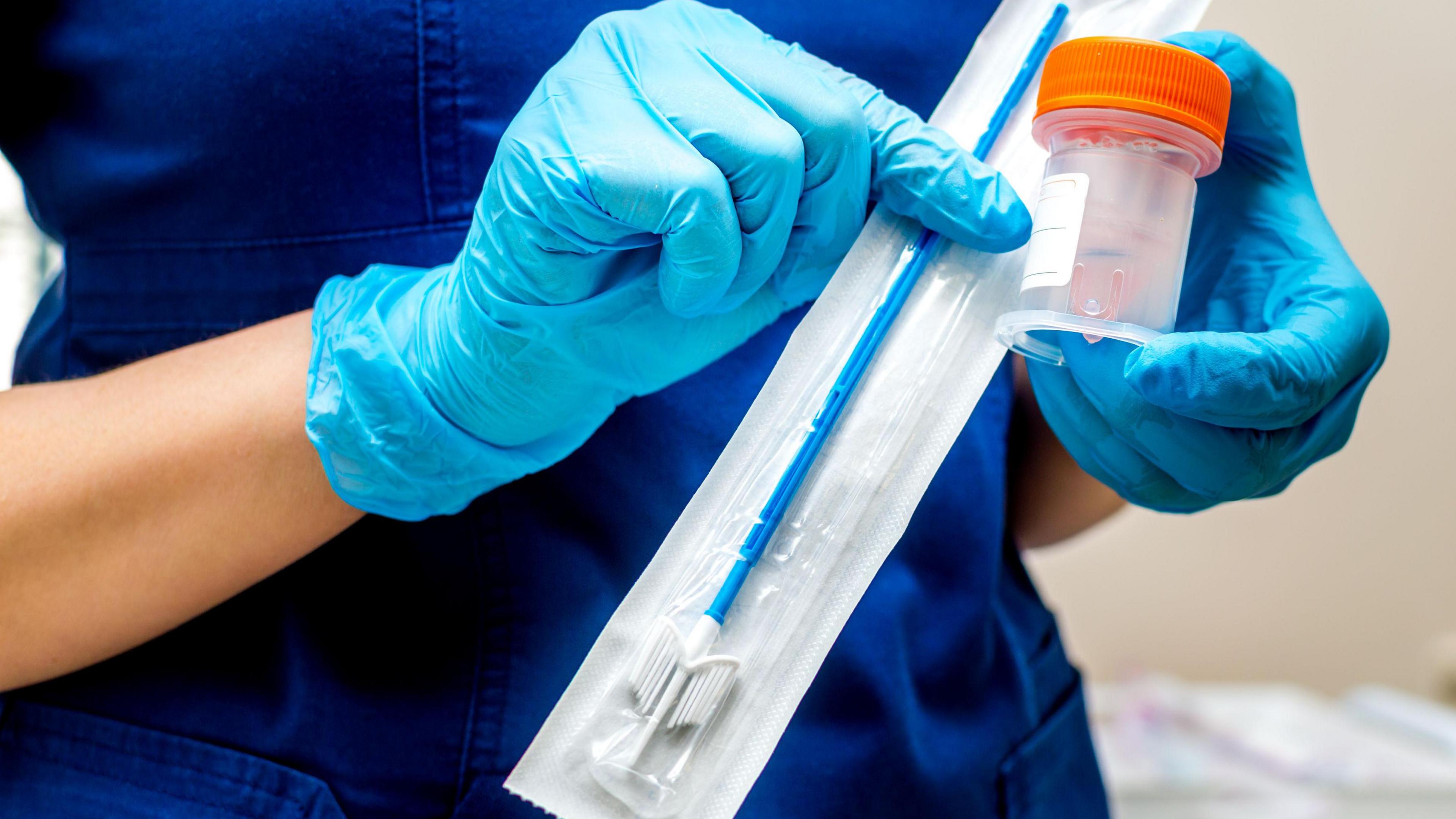Cervical screening review 'deeply regrettable'

Smear tests check the health of the cervix
- Published
The health minister has said that the ongoing review into the cervical screening programme in the Southern Health Trust is "deeply regrettable".
The comments came as part of a written statement to the assembly on Northern Ireland’s cervical screening programme.
The statement also said that an external review into cervical screening at the Western Health Trust found that the trust was applying a different threshold than others when categorising serious adverse incidents (SAIs).
Mike Nesbitt also announced that there is to be one regional laboratory service for cervical screening in Northern Ireland at Belfast Health Trust, instead of the current three.
Southern Health Trust review

Mike Nesbitt is Northern Ireland's health minister
Mr Nesbitt said he fully acknowledged the distress caused to many women by the review and the shortcomings detailed in the Royal College of Pathologists' report.
According to the Department of Health, 496 women are still waiting for their smear tests to be reviewed.
Ninety-seven percent of tests have been reviewed.
The Southern Health Trust had said it planned to have the review of slides completed by June 2024.
About 17,500 women in the Southern Health Trust had to have their smear tests re-checked as part of a major review of cervical screening dating back to 2008.
Some of these women were recalled to have new smear tests carried out.
It followed a highly critical report commissioned by the Royal College of Pathologists (RCPath).
As a result of the review and previously reported by BBC News NI, a small number (fewer than five) of higher-grade abnormalities have been identified to date.
Identifying abnormalities does not mean cancer has been found but it means that these women will require further clinical investigation.
Cervical cancer audit
If a woman develops invasive cervical cancer, an audit is undertaken to review their screening pathway for the purpose of learning and improvement.
Invasive cancer is when cancer cells spread from the original site.
Where an audit of a case of invasive cervical cancer is reported as a category 3 outcome, this is taken forward by the trust under the regional SAI process.
A category 3 outcome is defined as an unsatisfactory review which includes false negative cases or significant process or management shortcomings that constitute a patient safety incident.
As a result of pressures experienced during the Covid-19 pandemic, the DoH said there have been delays in some trusts completing these audits and sharing them with some women.
Work in this area is "now being prioritised" by all trusts to ensures these audits are completed in a "comprehensive and timely manner".
Some smear test scientists investigated over screening
- Published11 July 2024
17,500 cervical smear tests to be re-checked
- Published9 October 2023
Western Health Trust
Following a high number of SAIs in the Western Health Trust in relation to cervical cancer an independent review was carried out by a team of experts in Wales.
Between 2019-2023, the Western Trust reported an audit outcome in 12 cases as a category 3 (unsatisfactory) outcome.
This number is higher than the number of category 3 audit outcomes identified by other HSC Trusts over the same period.
Public Health Wales was commissioned by the WHSCT, in conjunction with the Public Health Agency (PHA), to provide clinical opinion on the cytology slides associated with these 12 cases.
Public Health Wales found that the number of category 3 outcomes occurred "as a result of the trust applying a different threshold than others when categorising cervical cancer audits with an 'unsatisfactory' outcome".
The health minister said there are no concerns by the PHA that the number of category 3 outcomes reported as part of the audit process "reflects underlying performance issues with the WHSCT's Cervical Screening Service.
In February 2024, a routine and unannounced inspection by the national accreditation body United Kingdom Accreditation Service (UKAS), found the WHSCT cytology service team to be "dedicated and competent with a supporting quality management system that is meticulously maintained".
There were no concerns identified in relation to staff competency as part of this inspection.
All laboratories which provide services as part of the NI Cervical Screening Programme as subject to these inspections.
The PHA has issued updated guidance to all trusts to support greater consistency in the categorisation of audit outcomes.
Analysis: Confidence shattered
Confidence in Northern Ireland's cervical screening programme has been shattered because of lengthy investigations and reviews into how screening is carried out and reported.
The delay in which some women received their cervical smear results has been unacceptable with some paying privately for their smear test as they couldn't cope with the wait.
That wait means, for some, lives have been put on hold.
The cervical screening shambles emerged in 2019 when a woman had to undergo a radical hysterectomy in the Southern Trust because screeners had missed abnormal cells in three different smear tests.
She'd developed cancer but by speaking out it triggered the major review of over 17,000 women carried out by the Royal College of Pathology.
While the outcome of that review is still not over we know a very small number of women require further investigation.
A separate review in the Western Health Trust has also caused upset for some women especially for 12 women whose cases became Serious Adverse Incidents.
After years of lagging behind the rest of the UK and the ROI, Northern Ireland is now up to date with cervical screening.
That delay and the ongoing reviews has knocked confidence in the system.
It’s now crucial that confidence is restored and women are encouraged to attend their smear tests when called.
One regional laboratory
It is also been revealed that the Belfast Health Trust is to house Northern Ireland's regional laboratory service instead of the existing three laboratories for cervical screening.
The Department of Health said that the recent introduction of primary HPV testing means only one laboratory is required.
According to the department the one-site laboratory service model which was a national recommended will start on 1 November 2024.
Amalgamating laboratory services onto one site will, according to the department, ensure that the "performance standards and minimum requirements of screeners and reporting staff are met and that public confidence in the screening programme is maintained".
Northern Ireland's outdated screening programme caused major delays in reporting results.
Almost every health trust was affected with reports of some women waiting more than six months for their result.
According to the health minister, this backlog has now been cleared with women receiving HPV negative smear test results within the recommended two weeks.